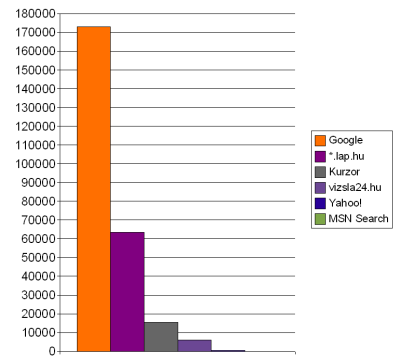Hungarian Search Engine Market Overview
I have been regularly evaluating the performance of different search engines on the Hungarian web for almost two years. This is a summary of the latest comparison made January, 2005.
Introduction of the compared engines
The big engines:
- Google search results can be restricted to pages in Hungarian and Google offers a partly translated interface in Hungarian, and this interface can be chosen at their Romanian and Slovakian localised versions too. (Both countries have significant Hungarian minorities.) Further pages like the About Google section are not translated, and often the quality of the translations seems to be rather unprofessional. Also some new features tend to be rolled out later here than on the .com version. Apart from the basic Web Search Google Inc offers few other services in Hungarian: AdWords, AdSense, Gmail, and Internet Explorer version of Google Toolbar. Google most likely has some servers in Budapest, and they have a subsidiary, but obviously without any considerable business activity.
- MSN Search has a Hungarian interface and the results can be restricted to Hungarian too, but this version doesn't operate on a separate domain name, and search.msn.com just shows up with English interface even if you visit the page with a Hungarian Internet Explorer or you get there using the search box on microsoft.hu... Of course there are a bunch of localized Microsoft products, they have even a headquarters in Budapest.
- Yahoo! allows you to restrict the results to Hungarian pages, but if you would like access their database using a Hungarian interface, you will have to visit vizsla24.hu (see below). Yahoo.hu is owned by Yahoo! Inc., but redirects to the central homepage. Currently none of their services is offered in Hungarian.
- ( Ask Jeeves offers its services only in some Western-European languages, and the results can be restricted only to those few languages.)
The local players:
- vizsla24.hu is powered by Yahoo! Search technology but. This service is linked to the biggest portal under the .hu domain: origo.hu
- zoohoo.hu shows results gathered by Jyxobot, the fourth most active search engine robot on the Hungarian web. This Czech technology called Jyxo powers some other Czech and Slovakian search engines too.
- kurzor.hu is powered by a proprietary search technology and the popularity of this engine is partly based on the fact that google.hu is redirected to this address.
- keres.sztaki.hu is developed by an academic research institute and its most innovative feature is a sophisticated stemming technology which recognises the different inflected forms ot the given keywords. (Would be a key feature for all engines, since Hungarian is an agglutinating language.)
- heureka.hu is the oldest of all Hungarian search engines, and a considerable percentage of its user base consists of the faithful users who started to use this service in the old days.
Database size examined using frequent words
I have searched for the 20 most frequently used Hungarian words on the net. These words aren't stopwords for most (international) search engines so summarising the displayed number of results we can figure out which engine has the most Hungarian pages indexed. (These values aren't exact, and in the case of internetional engines they can contain pages written in other languages, since their language recognition algos are far from perfect.) The graph below shows that Yahoo! claims to have the most pages, almost twice as Google. MSN 's performance is not so outstanding compared to the other regional search engines. (Note that Heureka did consider stopwords some of the keywords used.)


 Hungarian SEO writing about
Hungarian SEO writing about 